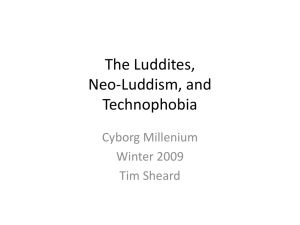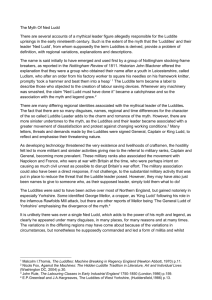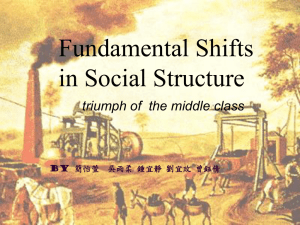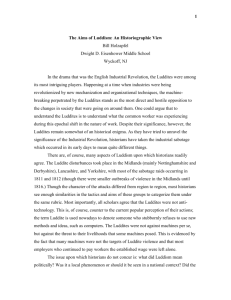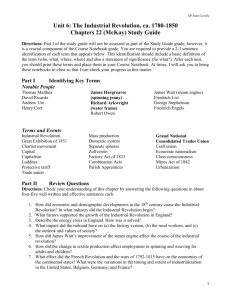Machine-Breaking as a Form of Economic Self
advertisement
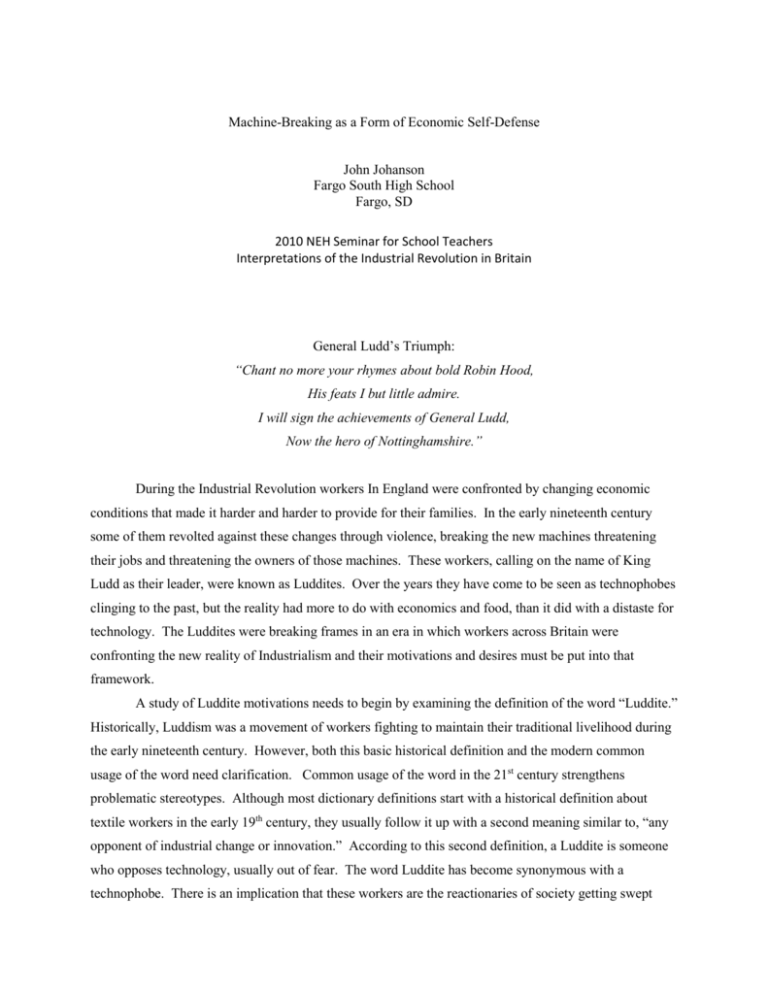
Machine-Breaking as a Form of Economic Self-Defense John Johanson Fargo South High School Fargo, SD 2010 NEH Seminar for School Teachers Interpretations of the Industrial Revolution in Britain General Ludd’s Triumph: “Chant no more your rhymes about bold Robin Hood, His feats I but little admire. I will sign the achievements of General Ludd, Now the hero of Nottinghamshire.” During the Industrial Revolution workers In England were confronted by changing economic conditions that made it harder and harder to provide for their families. In the early nineteenth century some of them revolted against these changes through violence, breaking the new machines threatening their jobs and threatening the owners of those machines. These workers, calling on the name of King Ludd as their leader, were known as Luddites. Over the years they have come to be seen as technophobes clinging to the past, but the reality had more to do with economics and food, than it did with a distaste for technology. The Luddites were breaking frames in an era in which workers across Britain were confronting the new reality of Industrialism and their motivations and desires must be put into that framework. A study of Luddite motivations needs to begin by examining the definition of the word “Luddite.” Historically, Luddism was a movement of workers fighting to maintain their traditional livelihood during the early nineteenth century. However, both this basic historical definition and the modern common usage of the word need clarification. Common usage of the word in the 21st century strengthens problematic stereotypes. Although most dictionary definitions start with a historical definition about textile workers in the early 19th century, they usually follow it up with a second meaning similar to, “any opponent of industrial change or innovation.” According to this second definition, a Luddite is someone who opposes technology, usually out of fear. The word Luddite has become synonymous with a technophobe. There is an implication that these workers are the reactionaries of society getting swept 2 away by the inexorable tide of progress. The original Luddites did oppose (some) technology and did lose that battle, although whether the loss was inevitable or the victory of machinery should be called progress is a matter of opinion. But the big problem with this definition comes from its implications for motivation. While these workers were fearful, it seems highly unlikely that they were simply afraid of the unknown. Luddism was not a fear of technology in general, but rather a fear of specific technology and its specific economic impact. The historical definition also presents challenges. It is generally accepted that Luddism existed in the Midlands, Yorkshire, and Lancashire from 1811 until 1816. While this seems straight forward, the reality is a lot more complex. For example, while most obviously Luddite writings refer to a King (or general or captain) Ludd, this figure was mythical in nature. Certain versions of the story hinted at a real world figure, such as those that claimed he was a young stockingframe worker who broke his own frame. However, many others, such as the Robin Hood allusions to Ludd hiding out in Sherwood Forest, suggest there was much more fiction than reality in this figure (Binfield 2004, XIV). Because multiple variations of Ludd exist, it is impossible to identify a single real person who played the role of the General. This mythical leader is problematic because while the movement had a common name throughout England, it did not in fact have a common leader. It was not a monolithic movement with one leader directing its actions and setting out a concise set of goals. Instead, Luddism was a many-headed beast and it is unclear if Luddites in Lancashire had any direct connection with those in Nottinghamshire, other than drawing on the same name to push their demands. But despite this lack of common leadership, there were some factors that can tie these groups together. No matter where they were from, Luddites opposed the introduction of new methods of production that they believed would decrease their wages. Their methods centered on threats and violence, to the machines threatening their livelihood, but also to those who owned these machines. These aspects help tie the movement together, but also contribute to a blurring of its borders. In the early years of the nineteenth century there were many workers who felt their livelihoods were threatened. Workers not traditionally seen as Luddites such as dockyard workers sometimes resorted to violence. Indeed the threat of class-based violence was never far from the minds of the upper classes in the era following the French Revolution of 1789. If these other groups shared the same basic characteristics as the Luddites, but did not call on the good General in their defense, were they also Luddites? Such groups are not generally included in Luddite histories, because they do not specifically call on the name of King Ludd. Yet it is important to remember that the Luddites were a part of a much larger process of worker protest during this period. All of these groups confronted similar issues of declining wages, long hours, and changing working conditions. The things that motivated dockworkers in Newcastle were likely to be the same things that motivated the Luddites of Nottingham. 3 The most obvious and direct motivation for the Luddites was the basic need to make a living. The new methods of production in the early nineteenth century reduced many of the laborers to “poverty and misery,” according to their own letters. By reducing the skill required to produce a product and increasing the total produced, the wages of the workers went down. Their songs, poems and letters consistently identified the struggling economic situation of the workers as the fundamental force driving them to violence. Letters from Luddites about to be executed identified hardship and distress as the key reason they joined the movement. (Binfield 2004, 162) The song, “General Ludd’s Triumph” emphasized that violence was not necessary until, “his sufferings became so severe.” This same song notes that the fight should continue “Till full fashioned work at the old fashion’d price, Is established by Custom and Law.” (Binfield 2004, 98) Technology was thus not truly the enemy – poverty was. A fair price would determine the end of the fight. This concept of a fair price is an important part of traditional European economics, frequently described as part of the moral economy. The basic concept of a moral economy is that the community and custom are more important than the market. This is in direct contrast to the capitalist market driven ideologies prevalent in the industrialist upper classes of the nineteenth century. The conflict between economic viewpoints can be seen in a Luddite declaration in which Charles Lacy, a mill owner, is described as having diabolical motives because he desires, “to gain riches by the misery of his fellow creatures.” (Binfield 2004, 72) A nineteenth century capitalist would have likely ignored the misery of the workers as simply the natural outcome of the market, while applauding the search for riches. Getting rich, after all, is the goal in a capitalist system. But for the Luddites the search for wealth at the expense of the community was worthy of a death sentence, which is exactly what this declaration laid on Mr. Lacy in November of 1811. For the Luddites the right to property was not the most important right, but instead should be made to serve the community. A master craftsman, whether a traditional guild master or modern industrialist, was not seen as an entity to himself but rather a part of the community with a responsibility to pay decent wages and provide a decent product, even if the market indicated otherwise. It is for this reason, as well as simple survival, that the Luddites were unwilling to accept the market oriented answers of the industrialists to their demands for a living wage. Also tied to the ideas of a living wage and a moral economy is the idea of the preservation of the old rules and customs within each craft. In an attempt to defend the moral economy the Luddites described themselves as the defenders of “the Trade” and attempted to enforce the old rules. The classic Luddite example is from the weaving industry in which the new, larger frames being utilized exceeded the size allowed by law. Not only did a defense based on the old guild laws attempt to preserve the Trade as they saw it, but also prevented the very large new frames that required less skill and produced a large quantity of an inferior product. Traditionally the masters were bound by these same regulations, and the 4 Luddites sought to hold the new masters to them. Another example of such a traditional law dealt with the use of apprentices. Because of the deskilling of many of the tasks associated with cloth production, one method some masters used to bring down wages was to break the old apprentice system. The framework knitters near Nottingham, for example, complained about the use of “colts,” workers who had not completed the seven year apprenticeship required by law. (Binfield 2004, 15) Jobs which required a seven year apprenticeship would naturally have higher wages and a limited labor supply compared to work requiring no apprenticeship. By breaking this apprenticeship system, wages could be reduced. Conversely, for the workers, attempting to defend this traditional system was critical to their attempts to maintain their wages, status as skilled workers and over all living standards. Luddites also believed that defending the quality of the materials produced would help to defend their livelihood. Under the old production systems these workers perceived themselves as highly skilled workers who produced a quality product. The new machines, while producing a large quantity of goods, frequently did produce a lower quality product. The new textile industry suffered from this problem as the new machines could neither spin nor weave as fine a product as the older technology produced. The decrease in quality not only reduced the value of the product, but also reduced the status of the worker who produced it. Both of these factors were likely to reduce their wages providing the workers with ample motivation to defend their traditional methods of production. This attempt to defend the traditional trade system represents an initial attempt by workers groups to work within the law, rather than resorting immediately to the violence usually associated with the name of Ludd. Petitions from workers were directed towards Parliament requesting that the law be enforced and the new masters be held to it. The previous examples of frame size and apprenticeship were both petitioned in this way. However, Parliament not only failed to enforce the law, but also actually repealed the laws that the workers were defending (Dinwiddy 1986, 23). When confronted by this Parliamentary action, the workers resorted to frame-breaking and other violence. The Framework Knitters issued a declaration in which they declared that parliament had been “deceived” in a “fraudulent and deceitful manner” and that anyone breaking into a mill and doing violence there would be innocent of any crime. In a similar manner, a letter from General Ludd in February of 1812 claims that wrongs shall be avenged because they have not been “taken into the least consideration by the government” (Binfield 2004, 112). Clearly it was expected, or at least hoped, that the government would defend the traditional system, but once that failed, violence was perceived as a just remedy. As the Luddites realized that the government had sided with the industrialists they began to target government officials as well as the industrialists with threatening letters. Spencer Perceval, the prime minister at the time, was one example of a political leader who received the attention of General Ludd (Binfield 2004, 112). This raised the question of political motivations. Were the Luddites part of a larger 5 political movement and seeking political reform as well as a redress of localized economic hardships? This is not an easy question to answer and historians have not come to a consensus, with historians like George Rude claiming little political motivation and others like E.P. Thompson believing that politics played an important role. Certainly politicians were threatened, but usually in response to a local problem. The letter to Spencer Perceval, for example, was the same one that was previously noted as stating that worker problems had not been “taken into the least consideration by the government.” In this and most other cases the involvement of political figures into the Luddite cause followed the development of local economic hardships. The Trade, foreign relations (most notably post-revolutionary France) and overall leadership were mentioned in declarations and letters, but only after referencing an issue of interest to the local workers. These local hardships, and not the politics, were the primary motivation. Clearly the Luddites were part of a larger movement and cannot be completely separated from it. This was an era of great disruption in the lives of workers all over the nation whether through changes in production or through the urbanization that went along with it. The Luddites were a part of that process. This was an era in which labor unions began and the Luddites, although not exactly a union, could not have been unaware of the concept. They even took oaths of loyalty, just as many early unions did. The growing political emphasis of Luddite writings as the government sided more and more strongly with the industrialists also tied into the growing movement for political representation. The followers of King Ludd might have called on their own unique leader for inspiration, but consciously or not, they were part of a larger pattern of working-class movements. These working class men who broke frames in the name of King Ludd represent the difficulties confronting people in a time of change. They defended their traditional craft and the traditional moral economy in an attempt to defend their livelihood. They attacked the latest technology and sent threatening letters to politicians not just in the name of King Ludd, but also in the name of fair wages and a decent meal. All of these actions that made their name synonymous with technophobia were not truly about technology. These actions were a form of economic self-defense as the workers sought to defend their traditional rights, wages and status within society from the dangers of the new society emerging around them. In the short term, this fight was lost as industrialism continued unabated. In the long run, the workers saw some benefits from the new technology, but would be perceived by others as technophobes. But no matter how others choose to define their actions, General Ludd was the “hero of Nottinghamshire” and other locations because his followers were defending their families and their livelihood. 6 Bibliogaphy Binfield, Kevin, ed. Writings of the Luddites. Baltimore: The Johns Hopkins University Press, 2004. Dinwiddy, J.R. From Luddism to the First Reform Bill. Oxford: Basil Blackwell Ltd., 1986. Rule, John. The Labouring Classes In Early Industrial England 1750-1850. London: Longman, 1986. Thomis, Malcolm I. The Luddites, Machine-Breaking in Regency England. Great Britain: David & Charles Archon Books, 1970. Thompson, Edward Palmer. The Making of the English Working Class. New York: Pantheon Books, 1964.
